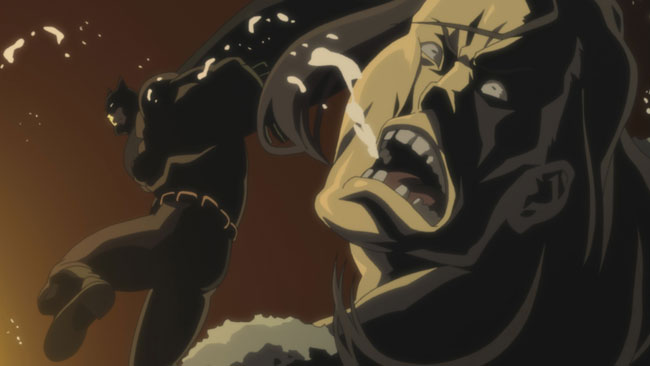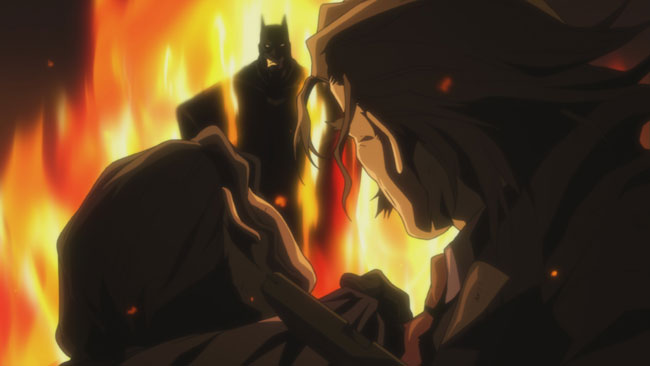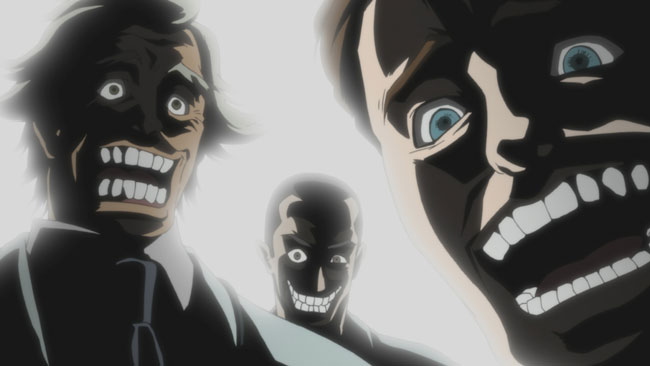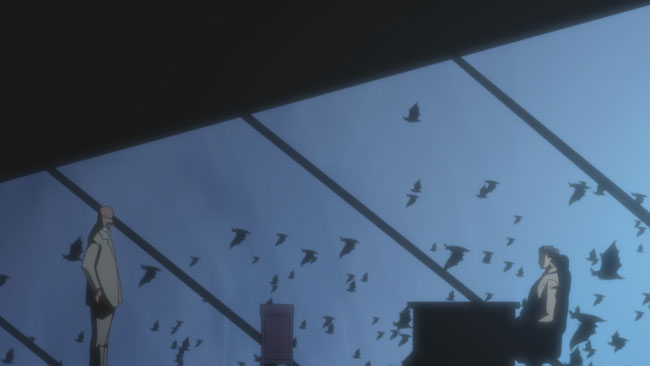![]()
Want a nice, frank conversation? Corner Greg Rucka and pick a subject. He is anything but restrained, speaking freely and constantly exuding the kind of creative flashpoint from which arises his fascinating array of benchmark characters.
Raised on California’s Central Coast, and schooled at Vassar College and USC, Rucka brings a street sensibility to his work – which has ranged from nearly a dozen novels and several short stories to a daunting list of comics, non-fiction essays and, now, a segment of the highly-anticipated animated film, “Batman Gotham Knight.â€
“Batman Gotham Knight,†the third film in the ongoing series of DC Universe animated original PG-13 movies, will arrive July 8, 2008 on DVD and Blu-Ray disc, and will also be available that day On Demand via digital cable and for download through broadband sites. The film is produced as a collaboration between DC Comics, Warner Premiere, Warner Home Video and Warner Bros. Animation.
Rucka will make the trek from his Portland, Oregon home to Wizard World Chicago this June to attend the world premiere of “Batman Gotham Knight†and participate on the post-premiere panel. With Rucka joining producer Bruce Timm and fellow BGK writers Alan Burnett and Brian Azzarello on the panel (and quite possibly a few yet-to-be-announced special guests), it promises to be an extremely entertaining evening.
Rucka has already built an astonishing career, complete with his share of Eisner Awards for works like “Whiteout: Melt†and “Gotham Central: Half a Life.†His characters, most notably bodyguard Atticus Kodiak and “Queen & Country†series protagonist Tara Chace, have drawn a legion of fans into his literary wake. He’s written for some of DC Comics’ best-known characters, including Superman and Wonder Woman. Inspired by his graphic novel of the same name, “Whiteout†will come to theaters as a major motion picture later this fall with Kate Beckinsale in the lead role.
But Batman is the subject today – and Rucka is happy to share his thoughts. For his segment, entitled “Crossfire,†Rucka brings to animated life the detectives familiar to fans of his “Gotham Central†comics – highlighted by the starring role of Crispus Allen. In the segment, which is the second chapter of the six-part film, the Gotham City police don’t trust the mysterious Dark Knight – until they get a first-hand experience of his power and integrity while both detectives and super hero are under fire.
If you want to read a great Greg Rucka biography, or two, go to his website – www.gregrucka.com. It’s worth the trip. What you won’t read there is the following Q&A … and if you like that, there’s even more interesting information, images, shout-outs and a brand new widget at the film’s official website: www.BATMANGOTHAMKNIGHT.com …
And now … the Q&A with Greg Rucka:
Question:
As this is your first time writing for animation, how did you feel about the translation of your words to the screen?
Greg Rucka answers:
It was dynamite, especially the final sequences of my segment. It was almost exactly what I was going for. What was really cool was to hear Kevin Conroy say stuff that I typed. I’ve written some screen stuff before, but I haven’t written Batman for the screen before. That’s cool on one level. But I love those Alan Burnett-Bruce Timm-Paul Dini animated series – I thought it was revolutionary – and Kevin was central to that.

Question:
As this film is produced in an anime-style, does the look of your segment come close to the way you envisioned that world?
Greg Rucka:
I try not to set my expectations to high or have any preconceived notions, because everything has to go through so many hands of creation. “Batman Begins†did such a great job of building Gotham that that was the Gotham that I was writing. In that sense, it is the city as I imagined it.
My biggest gripe is the pacing of the dialogue – I think I heard everything a lot crisper in my head. Like during this one conversation between the two main cops, I was trying to achieve the unique relationship between partners, and the familiarity that comes when they spend hours at a time talking in their car. Instead it was very heavy and argumentative.
But the flipside is that I really like the segment, and the film itself is brilliantly done. In a way, this is just like writing a comic in that it’s an entirely collaborative process. But trying to always be open to that collaboration and what it’s going to bring is a hard part of the job.

Question:
Were there any particular visuals that struck you within your segment?
Greg Rucka:
The image of Batman coming through flaming wreckage was pretty much exactly as I wanted it. I really was trying to get the psychological impact of seeing this man, who maybe isn’t a man if you don’t know, coming through the flames – literally a walking, talking, burning bush, standing and staring the villain down. If somebody was staring me down from the middle of flames, they could have anything they want. I think the animators executed that really well.
I also really like this moment when you’re in the squad room and you see the Batman silhouette through the dusted glass – because that was an image that I clearly had in my mind when I wrote it. You see what the detectives are seeing – not the Batman, but a shadow of the Batman. That visually goes to the trust issues.
Question:
Was there anything you definitely wanted to incorporate into your segment?
Greg Rucka:
I wanted that revolutionary moment for Crispus Allen, that moment of understanding of exactly what Batman is in the context of Gotham. I won’t give away any spoilers, but in that moment, that came across really well, too.
Ultimately, getting to use Cris was just great. And it was especially neat seeing Cris get picked up in some of the other pieces I didn’t write. In my 10 years of working for DC, there aren’t a whole slew of characters that I created that have been given legs and moved into the wider world. So just seeing Cris in three other segments was kind of a hoot.

Question:
How were you approached and what made you say yes?
Greg Rucka:
It was pretty much a no-brainer for me. It’s Batman, it’s animated … if you’ve gotten to write Batman before, then you know – it’s a thrill. It’s really, really fun. Plus, I was asked to bring that Gotham Central segment to this film, and that appealed to me on so many levels – particularly to my ego, in the sense that I love that element in that universe.
That approach really gives the everyman element – the view from the street. Most of the time in comics, and even in animation, we’re with the guy in the suit. And you forget what that guy in the suit looks like to everyone else.
Question:
How was the writing process for an animated film different than for comics?
Greg Rucka:
When you script comics, you can’t script action – you can only script a moment of action. Writing for film or television or animation or live-action changes that. You can write a sentence that says “running across the road†and they’ll actually run across the road. That’s the most obvious mechanical element. When you write a comic strip, I tend to be very controlling of what the camera is doing. When you’re writing for film, whatever the format, that’s not really your job. That’s the director’s job. So it becomes a task of conveying what information has to be seen – what the viewer must know – and hopefully the director gets it.
Question:
What were you setting out to accomplish in your segment in terms of balancing the theme of trust with all the action?
Greg Rucka:
The action element is easier to accomplish because you know there’s going to be a gun battle – I described some specifics, but I’m not going to script out the action beat by beat by beat. That would take 40 pages for 20 seconds of screen time. But the trust issue influences the writing at every level. My overriding thought was this: Gotham has no trust in the people it should trust, and that’s had a tremendous effect on all cops, especially the few good cops who have tried to do right. Crispus Allen is one of the good guys. But what he wonders is that, in a world where the most reprehensibly corrupt group is the cops, how are we going to fix that by turning to a masked guy who doesn’t have to answer to anybody?

Question: You’ve had some notable experience working on Batman – can you compare the differences in working on this Batman tale vs. the Batman, Detective Comics and Gotham Central comics?
Greg Rucka:
Almost everything I’ve written for Batman treats him as a fully established entity in that world. He’s known and he’s trusted. Every now and then there’s a story line that tries to shake that up, but we all know how that’ll end. Gotham Knight fits very tightly in the gap of continuity between the two (live-action) movies, right between that moment of introduction in Batman Begins and his first major battle in Dark Knight, so I’m getting to write it fresh – to write characters who are seeing Batman for the first time. Those were rich moments.
Question:
Are there any rules for you in writing for Batman?
Greg Rucka:
This is my favorite kind of Batman – when you see him in short bursts. Chris Nolan really made that point in “Batman Begins.†For Batman to work psychologically, you can’t see him coming. That’s the essence of the character. If YOU are watching the movie, and he’s about to leap off a building, sure, do a long sweeping shot of him and eat it up with a spoon. But if your point of view is that of one of the characters, nobody should see him for long. If you’re in Gordon’s POV, then he shouldn’t get a good look at the guy. Batman is always goal oriented – he’s not going to waste time. I think the key to writing Batman is to give him the fewest words possible, because he’s there to get the job done.
Question:
What’s your attraction to Batman?
Greg Rucka:
Aside from the cool factor? I love the inherent tragedy of the man. The really good characters in Gotham are filled with pathos. Your heart breaks for them – and especially for Bruce Wayne. When Batman is made properly, and Batman Begins certainly did this, what you’re seeing is a man who is driven by a fundamentally altruistic mission, even if it’s for the most personal reasons. And it’s a mission that he’s doomed to fail at. Still, he doesn’t stop. There was a line that I used in a Batman comic – and I’ve heard it echoed elsewhere – that Batman is on a fool’s errand. Well, it is a fool’s errand, but that doesn’t make him a fool.
Question:
You have extensive experience within comic book arena – what made this your genre of choice?
Greg Rucka:
It was purely by accident. I’m a novelist, but I’m also a novelist who has always loved comics. So when the opportunity came, I was going to take it. I had written a couple of novels, and I had an idea of a comic – Whiteout – and as a result I was brought to the attention of Denny O’Neil at DC Comics. He had read my novels, and he asked if I had any interest in doing some Batman stories. I was in New York at the time, and I said “Hell Yeah!†On the flight back, I wrote the whole script for the first story. I typed it up when I got home, sent it off a day later, and they called and said “What do you want to do next?†And all of a sudden, I was in the clutches of DC Comics, from which I’ve never fully escaped.
Question:
Where else would you like to creatively venture?
Greg Rucka:
I’ve got an interest in everything – books, comics, live-action, animation. I’ve got two young kids, so I’m trying to come up with a good young kids story. If I’ve got it in me, I’d like to find it. I’d also love to do a project that involved the colonial period of American history – it’s a period of such remarkable courage, and that appeals to me, maybe because of where we are in the journey of this nation right now.
Question:
As a writer, what do you see as the positives and negatives of the extreme passion of the comics fans today?
Greg Rucka:
The great thing about comics fandom is that it’s immediate. I write a novel and it’ll be a year before people tell me what they think of it. Comics fans react that day. Comics are in many ways like soap operas in that the fanbase rests mostly in the characters. Consequently, the fans can be prone to hysteria. With the prevalence of the internet, there’s been this movement where everyone wants to be an insider, everyone has an opinion, and everyone wants to spread the information as quickly as possible. Unfortunately, a lot of times, the information is wrong or horribly incomplete. That’s the huge downside. You have people reviewing the first 22 pages of a story arc that is going to span months, and that’s like judging a novel on the first paragraph of the book. You can’t judge the story before you know what it is – that’s what I find most annoying. But at the end of the day, you also have to remember that these things don’t exist without that fanbase – and they are devoted … and vocal.
Question:
As a comic book fan, and a comic book writer, is there a better time to be a “geek�
Greg Rucka:
This is the summer of the geek. Go down the line of movies and look what’s coming up, and it’s going to be insane. It’s truly fantastic and flattering to be a part of it. It’s not often you get to have a role in something that is going to live and endure long after you’re gone, and to have been a part of that legacy in any way, shape or form is an honor.
Question:
There have been so many different takes on Batman – how did you know yours was the right one?
Greg Rucka:
I don’t. But it’s the right one for me.
via Warner Bros. Home Video


